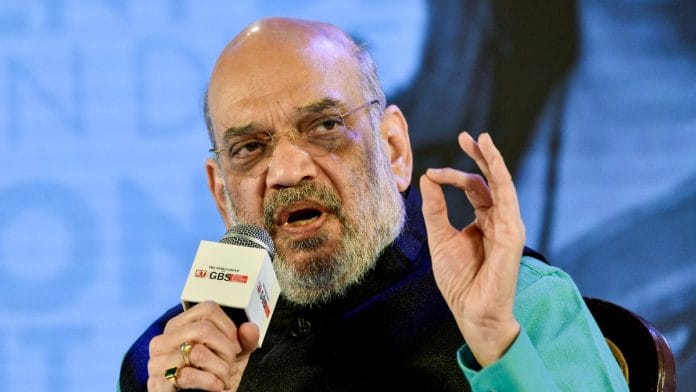Kolkata: Union Home Minister Amit Shah has declared that the Citizenship (Amendment) Act will be implemented before the upcoming Lok Sabha elections likely to take place in April-May — setting a timeline for its rollout for the first time.
His announcement is likely to have significant political implications in West Bengal, which sends the third-highest number of MPs to the Lower House. The CAA has faced stiff opposition from Chief Minister Mamata Banerjee, who has vowed she will not let it be implemented in the state, where the BJP continues to woo the Matua community, which has a decisive presence in the Bongaon, Ranaghat and Krishnanagar Lok Sabha constituencies as well as in pockets of north Bengal.
Ahead of the 2019 Lok Sabha elections, Prime Minister Narendra Modi himself had campaigned in Thakurnagar where the Matua vote bank is strong and the sect’s most sacred shrine — the Harichand-Guruchand temple — is located. Then in 2021, during the West Bengal assembly polls, the PM had travelled to Bangladesh’s Orakandi, which is the birthplace of the sect’s founder Harichand Thakur.
While speaking at the ET Now Global Business Summit 2024 in Delhi Saturday, Shah said, “CAA is the law of the land, it will be implemented before the elections. There should be no confusion. I want to make it clear, CAA will not take away anyone’s citizenship. Minority brothers and Muslims are being instigated. No one can lose their citizenship because of CAA, there is no such provision. It is a law to grant citizenship to religiously persecuted Hindus from Bangladesh and Pakistan, there should be no objection from anyone, I feel.”
The home minister also claimed that this was a promise that leaders of the Congress had made in the past. “When the nation was divided and the minorities left there (Pakistan and Bangladesh) from Hindu, Buddhist, Jain, Christian communities were facing difficulties and wanted to return to India, the Congress had asked them (refugees) to come to India slowly and promised to give citizenship after they were welcomed, but they took it back.”
Amit Shah’s significant announcement comes on the heels of his junior minister Nisith Pramanik’s remarks to ThePrint in an interview last month, where he’d said that the CAA was going to be implemented “very soon”.
Minister of State for Ports, Shipping and Waterways Shantanu Thakur and Matua community leader too had claimed last month that the CAA would be implemented “within a week” but later said it was a “slip of tongue”.
Meanwhile, Union Minister of State for Home Ajay Mishra had in November last year claimed that the Matua community in West Bengal will get citizenship soon and no one cannot deny them their right as the final draft of CAA is likely to be ready by 30 March this year.
The CAA was passed in Parliament in December 2019, to grant Indian citizenship to Hindus, Sikhs, Parsis, Christians, Buddhists and Jains from Pakistan, Afghanistan and Bangladesh who entered India before 31 December 2014, without any documents. After it was notified in 2020, the Ministry of Home Affairs sought multiple extensions from the Lok Sabha’s Committee on Subordinate Legislation — the parliamentary panel mandated to check if the powers to make regulations are being correctly exercised — to prepare the CAA rules.
Mamata’s Trinamool Congress (TMC) has long maintained that the CAA is only an election promise by the BJP and it won’t be implemented. “Our leader Mamata Banerjee has made it clear, CAA will not be implemented. When elections are knocking, they start saying CAA will be implemented. Since the last five years, they have been making promises, but we know the BJP doesn’t know how to keep a promise,” TMC spokesperson Kunal Ghosh told ThePrint.
Matuas and their political significance
A Dalit sub-caste traditionally known as Chandalas, the Namasudras historically resided in the eastern and central parts of undivided Bengal (now modern-day Bangladesh). The 19th century saw the caste group mobilise under a socio-religious protest sect called ‘Matua’, which got them their current name.
The Matuas form the second largest Scheduled Caste (SC) community in West Bengal. According to minister Shantanu Thakur, the Matua population in the state is around 2 crore (approximately 30 percent), but senior state government officials maintain it’s 20 percent. The community’s long-standing demand has been Indian citizenship that will give them equal opportunities and fulfill their hope of getting passports to travel which hasn’t happened yet due to lack of documents.
In the context of the upcoming Lok Sabha elections, the Matuas have a sway in North and South 24 Parganas, Nadia, Cooch Behar, Darjeeling, Alipurduar, and North Dinajpur districts.
Both the BJP and TMC have eyed this community. The BJP gave a ticket to Matua matriarch late Boro Maa Binapani Debi’s grandson Shantanu Thakur who won in the last Lok Sabha polls and was also given a junior berth in the second Modi cabinet. The TMC has assured the Matuas they have land rights, voting rights and thus don’t need any other documents to prove their citizenship.
Speaking to ThePrint, political analyst Snigdhendu Bhattachrya said the CAA rollout has the BJP under pressure. “Let’s see if the rules are notified before 30 March. The BJP is under pressure. On one hand it has promised citizenship under CAA to the Matuas in politically significant Bengal and Mamata has opposed it tooth and nail. It will be a sticky situation ahead of Lok Sabha polls. If implemented, BJP is likely to gain in Bengal.”
(Edited by Gitanjali Das)






